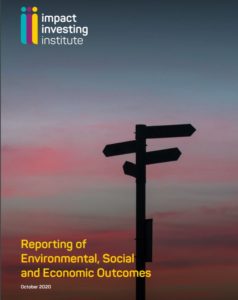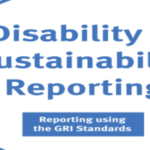
More and more consumers, investors and policy makers are interested in the long-term sustainability of businesses. They want to see companies report transparently on the positive and negative impact of their business activities on the environment and society. But the lack of a global reporting standards, similar to the International Financial Reporting Standards (IFRS), make it difficult for companies to measure and report their impact in a consistent and comparable way. As a result, consumers and investors find it hard to access comprehensive and clear information about the impact that companies have on people and the planet. The Impact Investing Institute (UK) has set out its vision for transparent, consistent, comparable reporting of environmental, social and economic outcomes in this briefing paper.
The institute is working towards the adoption of high-quality standards for impact measurement, management and reporting so that businesses and organisations incorporate impact at the heart of their business models.
Making impact reporting easier and more accessible
“I spoke to a CEO of a FTSE 100 company who said they were reporting on sustainability issues across more than 120 different metrics and channels.” Sarah Gordon, CEO, Impact Investing Institute.
To achieve that goal, we:
- Work with practitioners, partners and policy makers and key stakeholders to develop, adopt and implement sustainability reporting standards in the UK.
- Collaborate with the Impact Management Project, the leading forum for building global consensus on how to measure and manage impact, on reporting of social and environmental outcomes reporting.
- Have helped to establish a sector-standard approach for Environment, Social and Governance (ESG) reporting in UK social housing.
- Support the global convergence and increased adoption of high-quality standards for measurement, management and reporting of environmental and social outcomes in our response to the European Commission’s consultation on the review of the Non-Financial Reporting Directive.
- Advocate in the UK for the introduction of a mandatory Public Interest Statement and the launch of a ‘good practice’ public interest reporting initiative to pave the way towards legislation as part of the Department for Business,Energy & Industrial Strategy’s (BEIS) Audit Inquiry.
- Mapped the impact reporting landscape in a report on implementing a culture of social impact investment in the UK.
- Highlighted that significant action from keystone players is needed to advance impact reporting practices as part of a report on technology-enabled impact reporting practice across the investment chain, in partnership with Deloitte.
In the long term, we want to see the global convergence of sustainability reporting standards, equivalent to global financial reporting standards and managed by an international governance body. To achieve that, key stakeholders such as standard setters, governments, companies and data providers must come together to develop suitable and robust reporting standards.



